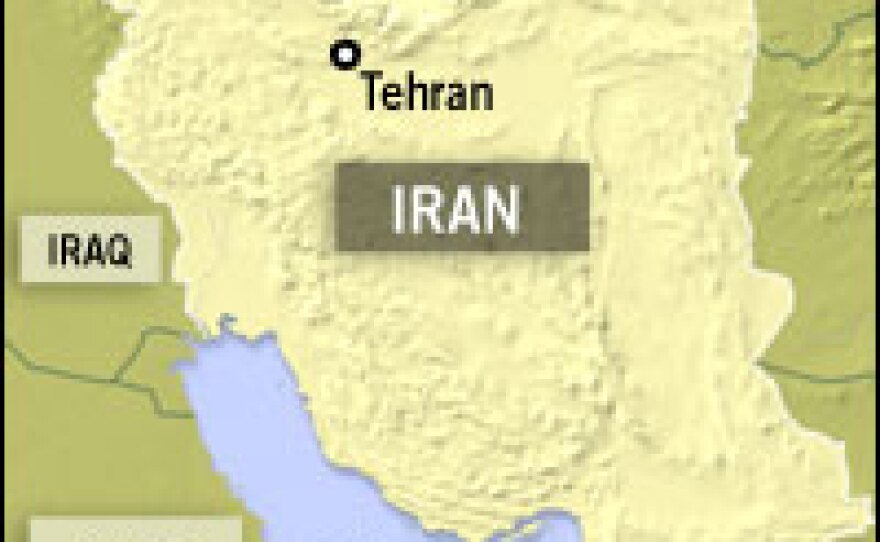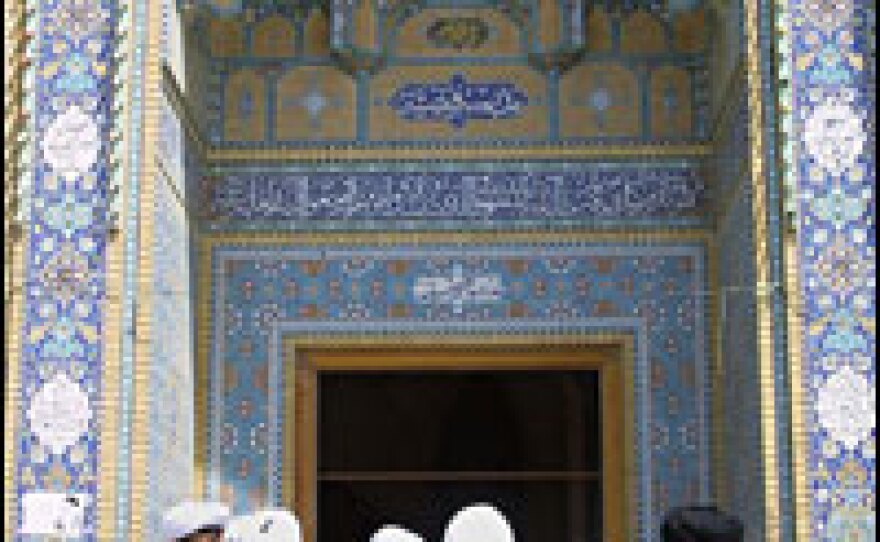

A nation of 70 million, Iran is one of the largest oil exporters in the world. And with its long coastline, good highways and railroad links to Central Asia, it is a natural crossroads and trading partner.
Many Iranians believe that their homeland is destined to be the regional power in the Middle East.
"This country –- it is already the superpower of this region," says Hamid Zaheri, a former official in Iran's oil ministry. "It has got the rightful position. There is no way to go back."
For Iran to hold that position, however, it must contend with some significant drawbacks: It is a Persian state in a region dominated by Arabs, and a Shia Muslim nation surrounded, for the most part, by Sunni states.
Iranians have been talking about the destiny of their nation for years, but it took actions by the United States to help make its rise a reality. The United States removed the Taliban from power in Afghanistan and then ousted Saddam Hussein in Iraq — actions against Iran's two most dangerous enemies, notes Augustus Norton, an expert on the Middle East at Boston University.
"It's stunningly true that Iran has been the great geopolitical victor of American sacrifice in war," Norton says.
Revolutionary Zealotry
In Qom, a holy city for Shia Muslims, ayatollahs and their followers debate the fine points of Islam and help to formulate the policies of the Islamic Republic. Like many Iranian leaders, the clerics in Qom view Iran as under siege, the victim of hostility generated from near and far.
"There [is] lots of negative propaganda against the Islamic Republic," says Vali Beybi, spokesman for Qom's clerical establishment. "They are trying to deceive other Muslim nations against the Islamic Republic. But we believe that one day when Imam Mahdi will reappear to the people, he will have all the countries under his umbrella. It means that there would be Islamic law prevailing in the whole world."
The notion that the Imam Mahdi, the 12th Shia imam, will reappear in the world to carry the Islamic Revolution beyond Iran's borders, worries Iran's neighbors.
This revolutionary zealotry in the modern age began with the 1979 revolution that overthrew the Shah and brought Ayatollah Khomeini's version of Islamic rule to power, but Shia ambition is nothing new in Persian history.
In the early 16th century, the Safavids, conquerors from eastern Turkey, brought Shia Islam to Persia. Since that time, Iran has tried to set itself apart and above its Sunni neighbors to the west and to the east, says Vali Nasr, author of The Shia Revival.
"The Iranian kings try to claim the leadership of the Muslim world," Nasr says. "They see benefit in differentiating Iranian identity from that of the Ottomans and the Arab lands that they were ruling over. This was partly accomplished by the fact that Iranians have an Iranian culture and the Persian language, but partly by embracing a different branch of Islam, which would then really separate Iran from its Muslim neighbors to its west."
Deep Internal and Regional Divisions
But this assertion of difference has more often undermined Iran's claims to lead the Muslim world, a fact that Iran's early revolutionary leaders eventually learned, according to Augustus Norton.
"Despite Iranian claims that this was 'an Islamic revolution,' many Sunni Muslims — most Sunni Muslims — rejected that claim," Norton says.
Many Iranians have also been skeptical. Politically, Iran is a deeply divided society, with conservatives and reformers constantly struggling for preeminence. Ethnic tensions have also had an impact on the Iranian state, says Gregory Gause, director of Middle East studies at the University of Vermont.
"We tend to think of Iran as a national state, and it has developed that way. But the Iranian nationality itself is only about half the population of Iran. You've got Arabs. You've got Turks. You've got Baluch. You've got a mix of tribal people," Gause says.
There is a great sensitivity among Iranians about the vulnerability of the state to regional separatism — the Arabs in oil-rich Khuzestan province, the Kurds and Azeris in Northwest Iran and the restive Baluchistan province in the East, bordering Pakistan.
Sometimes, Iran responds with territorial threats of its own. Hossein Shariatmadari, editor of the hard-line daily newspaper Kayhan, caused a stir recently with an editorial reviving the claim that Bahrain, the tiny Arab island nation across the Persian Gulf, was historically part of Iran. The foreign minister was forced to travel to Bahrain to calm fears caused by the editorial.
After a long period during which Iran's more liberal leaders sought to improve relations with the gulf states, tensions with Iran's neighbors are growing. Articles recently appeared in the Iranian press of alleged Saudi Arabian claims on some of Iran's oil fields.
Less Tension, More Economic Growth
Aboard the tugboat Moharram in the harbor at Bushehr, on the Persian Gulf, tensions about Iran's future comes into clear focus. The local authorities are hard at work expanding Bushehr's port, and Iran's only nuclear power plant is also under construction there, protected by early warning radar and anti-aircraft missiles and guns. If the nuclear crisis deepens, Iran will use ports like this to evade economic sanctions.
Nevertheless, Iran's economy is vulnerable. Two months ago, the government imposed gasoline rationing to counter the waste of highly subsidized gasoline that is undermining the country's finances, says Heydar Pourian, editor of the monthly magazine, Iran Economics.
"We are already seeing some slowdown in the economy, which is partly because of government's decision-making, partly because of the threats of more sanctions by the U.N. and also the U.S.-led banking finance actions that have had impact on our economy, and some capital flight," Pourian explains.
The growth of Iran's economy is key to its emergence as a true regional power, but politics and regional tensions are linked to Iran's economic prospects, notes Ali Shams Ardekani, an economist and businessman.
"We have to work very hard to achieve this level of economic activity, which means also we have to reduce, if possible, tension," Ardekani says. "We have to reduce the military expenditure of our neighbors. Iran is spending on the military less than Turkey, less than Pakistan, less than Saudi Arabia, so we should invite the other people in the region to spend less on the military and more on socioeconomic development."
But winning over its neighbors will be difficult as long as Iran frightens them with the pursuit of nuclear technology, talk of claims on neighboring territories, and rhetoric about an Islamic revolution long ago rejected by other nations in the region.
Copyright 2022 NPR. To see more, visit https://www.npr.org. 9(MDAzMjM2NDYzMDEyMzc1Njk5NjAxNzY3OQ001))







